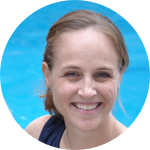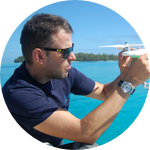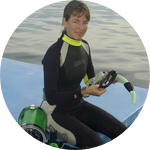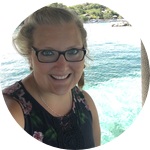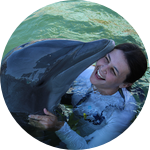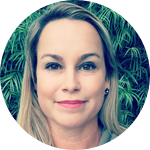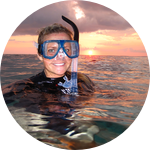About This Project
Atlantic bottlenose dolphins (Tursiops truncatus) are a coastal species found throughout inshore waters in Florida. Our goal is to document and estimate the abundance and habitat use patterns of bottlenose dolphins in the Upper Florida Keys. These data will improve the conservation and management of this sentinel species in local waters, as well as provide important insight regarding the health and stability of Florida Keys marine habitats.
Ask the Scientists
Join The DiscussionWhat is the context of this research?
As sentinels of environmental change, understanding how these animals behave and assessing the population is crucial in conserving the fragile marine ecosystem. Previous studies in locations such as Shark Bay, Australia and Sarasota Bay, Florida have identified and catalogued hundreds of individuals, and are able to track these animals over their life spans. Dolphins are apex predators, playing an important role in a healthy ecosystem. With increasing pressures on coastal environments due to climate change and human interaction, the monitoring these populations can tell us a great deal about the health of the ecosystem as a whole. The goal of this project is to establish a database of the wild bottlenose dolphins that currently inhabit the waters of the Upper Florida Keys.
What is the significance of this project?
This project will generate invaluable information regarding the population of bottlenose dolphins in Florida Bay and the Upper Florida Keys. As a sentinel species, these animals serve as indicators of environmental stress. The data collected will provide insight into the health and stability of the unique Florida Keys ecosystem, which is exposed to a barrage of anthropogenic stressors. Additionally, Dolphins Plus Marine Mammal Responder operates the only rescue and response organization for stranded whales and dolphins in Monroe County, making surveys of resident populations critical to response efforts and the potential to identify early warning signs.
What are the goals of the project?
This project will discern what the population and habitat distribution of coastal bottlenose dolphins in the Upper Florida Keys in order to better conserve and manage these animals. This permit received from the National Oceanic and Atmospheric Administration (LOC: 21556) allows DPMMR researchers to begin data collection on July 1st, 2018. Researchers will collect behavioral footage and photo identification data on the Florida Bay/Upper Florida Keys bottlenose dolphin stock to improve our understanding of abundance, range, and habitat use patterns.
Budget
The equipment listed is critical to the sound collection, storage, and analysis of behavioral and photographic data. The high quality cameras will capture fine-scale details in dolphin behavior and dorsal fin characteristics utilized to establish habitat use patterns and identify individuals, respectively. All data will be stored and backed-up on two, external hard drives, each protected with a case. Required fees for taxes, shipping, and Experiment.com have been included in this budget.
Endorsed by
 Project Timeline
Project Timeline
The survey permit has been granted for a five year period, beginning on July 1, 2018 and ending in May of 2023. Boat survey trips to document and record bottlenose dolphins are scheduled to occur twice a month for 5 years, weather permitting. These data will be compiled into a photo-ID catalogue and database for analysis and interpretation.
Jul 01, 2018
Commencement of the Photo Identification and Behavioral Recording Program
Jul 02, 2018
Project Launched
Aug 01, 2018
First Boat Trip Completed
Jan 01, 2019
Video Update Post
Jul 01, 2019
Video Update Post
Meet the Team
Team Bio
The Dolphins Plus Marine Mammal Responder Research department is comprised of three women with combined experience in marine mammal science totaling over thirty years. Jill, Holli and Kelley also lecture at the University of Miami's graduate school, the Rosenstiel School of Marine and Atmopsheric Science. They enjoy advising graduate projects that benefit the students and the scientific community. Areas of particular interest include dolphin welfare, communication, cognition, and behavior.
Kelley Winship
I am a Research Associate at the not-for-profit organization Dolphins Plus Marine Mammal Responder. I received my Bachelor's degree from the University of Miami in Marine Science and Biology, and attended the University of Southern Mississippi for my Master's and Doctorate degree in Experimental Psychology. I have always been fascinated by dolphin cognition, and I strive to conduct research that is not only engaging for the animals, but provides meaningful information in order to better conserve and protect these species.
I am also a lecturer at the University of Miami's Rosenstiel School of Marine and Atmospheric Science, teaching a graduate level course discussing the conservation, research, and management strategies practiced with marine mammals. I strive to provide my students with hands-on learning opportunities, career and research guidance, and a strong foundation of knowledge in the field.
Jill Richardson
I began working as a scientist in the marine environment over 24 years ago in the Turks and Caicos Islands, where I assessed the sustainability of local lobster harvesting practices. This is where my passion for other cultures and conservation-focused marine science began. My desire to mix creativity, education, and research led me to Dolphins Plus Marine Mammal Responder, where I developed extensive research and experiential learning programs for students of all ages and marine science educators.
I am also a faculty member at the University of Miami, Rosenstiel School of Marine and Atmospheric Science and the Director of the Marine Ecosystems and Society Department. I teach and mentor both undergraduates and graduates, with an emphasis on local, marine ecosystems and practical field training. My overarching goal is to foster innovation, environmental stewardship, and civic engagement.
Holli Eskelinen
Learning about the marine environment and advancing our understanding of marine mammals is my passion! Hired at Dolphins Plus Marine Mammal Responder in early 2001, my dream of working and learning about dolphins was fulfilled. Through the evolution of wanting to work with dolphins, to striving to learn more about their behavior, communication, cognitive abilities, and how they perceive their world I realized that acquiring knowledge about animals, contributing to the existing body of scientific literature, and educating the public is crucial to protecting and furthering our understanding about the marine environment.
For the past decade, we have conducted and published research on marine mammal behavior, cognition (imitation, working memory, perception, innovative behavior), acoustics (communication), animal welfare, energetic requirements and nutrition, clinical reference intervals, and participated in national and international scientific conferences. Currently, I also work as a lecturer at the University of Miami in the Marine and Atmospheric Science Department and adjunct at the Marine Mammal Behavior and Cognition Laboratory at the University of Southern Mississippi, where I have the privilege of serving on the committees of numerous graduate students (Masters, Ph.D.). I am passionate about assisting students with project development, data collection analysis, and dissemination through publication, with the ultimate hope of inspiring young scientists to contribute to the field. My enthusiasm for advancing marine mammal science is fueled daily by the numerous non-invasive, independent investigations; I embrace the role as scientist, caretaker, and educator.
Lab Notes
Nothing posted yet.
Project Backers
- 17Backers
- 110%Funded
- $776Total Donations
- $45.65Average Donation
